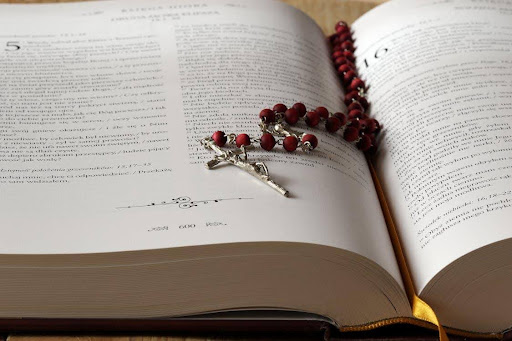For Frederick J. George, author of “Switched At Birth: My Life In Someone Else’s World,” religion influenced every facet of his life.
As a child raised in a Roman Catholic Lebanese family, he experienced faith in both challenging and formative ways, guiding while developing a lifelong contemplation of identity and belonging.
In his memoir, Fredrick describes his household as deeply inspired by their catholic traditions. Every evening, they prayed, performed rituals, and recited the rosary. According to the author, his family’s nightly gathering was not just an obligation but a reaffirmation of their familial bond under God’s watchful eye.
Sundays were sacred, reserved for Mass, where his sister Myra often led him by the hand, ensuring he stayed true to the spiritual path laid out for him.
Despite the comfort these practices provided, they were also a source of confusion for a young boy who often felt out of place. Among his siblings, Fredrick was always the reserved one. His light features stood out in a family otherwise characterized by rambunctious personalities and darker complexions.
These differences and Fredrick’s father’s jesting about him being an “Ugly Duckling” gave him pause and made him doubt that his Catholic faith was insufficient to resolve the situation. However, his mother’s selfless support kept reminding him that love and acceptance transcend every surface-level difference.
Straddling Two Worlds
As Frederick grew older, he questioned his identity and didn’t know why he felt this way.
Born into a Scottish Presbyterian family but unknowingly switched at birth, he was raised with values deeply rooted in Catholic teachings while biologically connected to his Presbyterian Churchman family.
When he discovered his biological family, it got easier to understand where his doubts, differences, and understanding of faith and belonging came from.
Reflecting on these two worlds, Frederick realized how deeply religion influenced both sides of his lineage. The Georges’ Catholicism taught community, tradition, and loyalty, qualities he grew up with. The Churchmans’ Presbyterian faith prioritized resilience and individual growth, an opposing but complementary perspective he grew to appreciate later.
Lessons in Acceptance and Resilience
Catholicism taught Frederick discipline and gave him the tools to face life’s difficulties gracefully. As a child, he overcame many health challenges, from wearing plaster casts on his legs to running marathons in later years. His mother’s unfaltering encouragement shows the mental strength that comes with faith, which is also a central principle of Catholicism.
Fredrick’s Mom’s words, “When life hands you a hurdle, jump it,” carried him through life’s toughest challenges.
Still, Catholicism’s rituals and expectations sometimes felt like a burden. The Church’s strict rules, from fasting before communion to avoiding meat on Fridays, occasionally conflicted with Frederick’s internal curiosity and independence. His teachers at Catholic school, often strict nuns, added to this tension with their stern enforcement of discipline.
However, in their own way, they reinforced the values of diligence and morality that have remained with him.
The Impact of Identity on Faith
The revelation of being switched at birth challenged Frederick’s understanding of religion and its role in his life. He wondered how his beliefs and experiences might have differed if he had been raised within the Churchman’s Presbyterian traditions instead.
Would he have grown up with the same sense of community? The same resilience?
It’s impossible to know, but this duality forced him to see faith not as a monolith but as a spectrum of influences molded by context, culture, and personal experience.
A Bridge Between Two Worlds
Frederick grew up with Catholic and Presbyterian influences. This taught him to look past religious labels and see the shared values of love, resilience, and hope.
Whether at a Catholic Mass or connecting with his Presbyterian roots, Frederick realized faith meant carrying forward positive human lessons. The discovery of his biological heritage opened his eyes to the fact that despite differences, all faiths promote compassion, strength, and optimism.
They unite rather than divide. It’s a lesson Frederick continues to teach us through his autobiography, “Switched At Birth: My Life In Someone Else’s World.”
The book is now available on Amazon.









